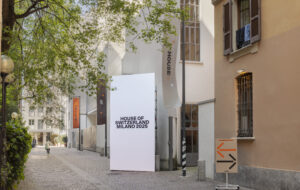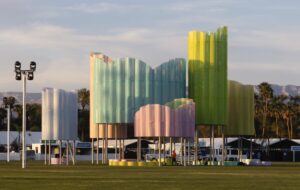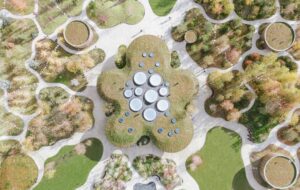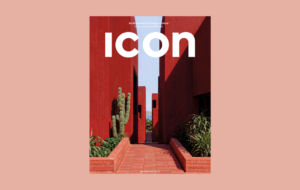The Lagos-based Nigerian architect has been announced as the curator of the Sharjah Architecture Triennial’s second edition opening in 2023
 Tosin Oshinowo. Photography by Spark Creative
Tosin Oshinowo. Photography by Spark Creative
Words by Sonia Zhuravlyova
Sharjah Architecture Triennial, a platform for architecture and urbanism from West Asia to South Asia and the African continent, has announced the appointment of Lagos-based Nigerian architect Tosin Oshinowo as the curator of its second edition.
Bartlett and AA-trained architect Oshinowo is the principal of cmDesign Atelier, the architecture studio she founded in 2012 in Lagos. Her practice is known for blending contemporary minimalism with a site-specific approach, using local materials and technologies where possible. One of her projects, currently underway, is an entirely new community in northern Nigeria, built for a village displaced by Boko Haram.
Although the theme of the triennial is yet to be announced, the organisers are sure that the second edition will build on the success of the first, which debuted in the Emirati city in November 2019. The first edition, which was curated by Adrian Lahoud, looked at how architecture can serve future generations in the region. Oshinowo was chosen thanks to her architectural approach, as well as her awareness of societal and environmental impacts of design, which chime with the triennial’s mission.
‘The theme of adaptability that is central to Oshinowo’s curatorial proposal builds on the Sharjah Architecture Triennial commitment to addressing the challenging conditions we face not only in the Global South but around the world,’ says Hoor Al Qasimi, director of the Sharjah Architecture Triennial. ‘With a breadth of knowledge and experience from her work in an African context, she brings to the second edition a decisive, and much needed, focus on socially responsive approaches to architecture and urbanism.’
‘I am honoured to be appointed as curator of the 2023 Sharjah Architecture Triennial, which provides a ground-breaking platform to celebrate the architecture and urbanism of the Global South,’ says Oshinowo. ‘My approach is inspired by the history, traditions and landscape of Sharjah and other cities across Africa, the Middle East, and Asia, exploring architecture and design solutions that are built from conditions of scarcity.’
Oshinowo adds: ‘I’m looking forward to working with my colleagues around the world to illuminate a pathway that reorients our global conversation on sustainable architecture, urbanism and infrastructure.’
Get a curated collection of design and architecture news in your inbox by signing up to our ICON Weekly newsletter


















